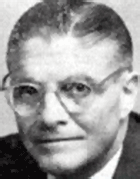
Einstein
once said:
“The significant problems we face cannot be solved at the
same level of thinking we were at when we created them.”
As we pass the midway mark for 2014,
FlyingTypers begins a multi-part summer reading
series that looks back at issues published during the first half of
the year.
 The idea is to offer a look back at various topics from just a few months
ago so that we may reflect on what has happened and draw conclusions
to better inform air cargo’s future.
The idea is to offer a look back at various topics from just a few months
ago so that we may reflect on what has happened and draw conclusions
to better inform air cargo’s future.
If you missed some news this “refresher”
might prove useful.
We know we serve some pretty smart, inventive,
and engaging people in today’s air cargo business—people
who are probably too busy to remember all the pressing—and constantly
revolving—issues of the industry.
In the case of our opening remarks by
101-year-old “super senior” and FlyingTypers
Editor Richard Malkin, (left) what was said in January 2014 dates so
far back in air cargo history that all the questions might already be
answered.

 Credit
Air Express International (AEI) for being America’s (and possibly
the world’s) first forwarding company wholly devoted to air transport.
Credit
Air Express International (AEI) for being America’s (and possibly
the world’s) first forwarding company wholly devoted to air transport.
The route to this development revealed a bit of a twist in history:
Opportunity knocked at the door of 24-year old Chester Mayer, (right)
a New York customs broker, when Pan American Airways which handled its
own import clearances, found itself entangled in a serious customs problem.
This led to a decision by Pan Am to farm out its customs clearances
to an independent customs specialist.
The offer was made to Mayer, and almost
overnight AEI came into existence in Miami.
The time was the nadir of a cheerless
Depression—but the remembered counsel by some old Roman whose
name he could not recall was to “let nothing pass that will advantage
you.”
Eventually AEI edged into shipping small
packages by air via airplane, flying boat and even zeppelin.
These shipments supplemented surface borne
traffic.
All-air was Chester Mayer’s close-held
dream. It was fated to come true.
Richard Malkin

 , ,
 After
a 2013 of largely non-plussed market commentary, Stanley Hui Hon-chung
was moved to enthuse that “fuelled by burgeoning demand from
the traditional Christmas peak season, we expect this promising
growth in cargo to continue throughout the rest of the year.” After
a 2013 of largely non-plussed market commentary, Stanley Hui Hon-chung
was moved to enthuse that “fuelled by burgeoning demand from
the traditional Christmas peak season, we expect this promising
growth in cargo to continue throughout the rest of the year.”
Those are strong words indeed
from the phlegmatic Chief Executive Officer of Airport Authority
Hong Kong.
SkyKing
|


A joint press release by the industry triumvirate—TIACA/IATA/FIATA
plus ICAO—reported that after “a two-year research project…
the ‘higher-skills,’ which include leadership, team-building
as well as market and financial analysis techniques…” concluded
that the “availability of air cargo-focused programs that teach
these higher-level skills is limited.”
Officially titled "Air Cargo Industry
Education and Training Task Force-“Identifying The Educational
Needs For A Vibrant Air Cargo Industry In The Future,” the
authors of the report “agreed that the industry as a whole must
address this deficiency," and went on to list a number of dire
consequences, should their ideas not be followed.
These include “difficulty of attracting
qualified talent to successfully lead the industry through future challenges”
and “the loss of rising managers to other (unidentified) sectors
of the logistics industry or to other industries.”
Just as “Higher Skills’ came out
Eric Schmidt, the chairman of Google, at the 2014 World Economic Forum
in Davos warned the jobs problem will be “the defining one”
for the next two to three decades.
Given the constant development of new technology,
Mr. Schmidt said that more and more middle class workers would lose
their jobs and “it was not clear if workers have the right skills
to be rehired.”
He compared the situation to the industrial
revolution, while calling for more industry-wide innovation: “it’s
a race between computers and people – and people need to win.”
Schmidt added, “as more routine tasks
are automated, this will lead to much more part-time work in caring
and creative industries; the classic 9-5 job will be redefined.”
Ted Braun


India’s only air cargo show—Air Cargo India 2014, the every
other year event opened amidst hopes for a resurgent air cargo industry
driven by an active India market coming back after a luke warm 2013.
Vinod Kaul, a senior tradesperson and business development manager described
the action:
 "There was lots of positive energy, hope and air of expectation
that the situation will get better.”
"There was lots of positive energy, hope and air of expectation
that the situation will get better.”
 While everyone at that event said that there
was an urgent need for closer cooperation in the supply chain, Nabil
Sultan, Divisional Senior Vice President Cargo of Emirates Airlines,
took that thought one step further to highlight the fact that there
were fundamentals that needed to be put in place to ensure that profits
roll in: from fuel-efficient planes to yields and tonnage.
While everyone at that event said that there
was an urgent need for closer cooperation in the supply chain, Nabil
Sultan, Divisional Senior Vice President Cargo of Emirates Airlines,
took that thought one step further to highlight the fact that there
were fundamentals that needed to be put in place to ensure that profits
roll in: from fuel-efficient planes to yields and tonnage.
Peter Scholten, Vice President Commercial,
Saudia Cargo emphasized that India’s passenger carriers with cargo
businesses should be encouraged.
Tirthankar Ghosh


Biggest most important event held in 2014 from February 5th until February
7th in the German Reichshauptstadt Berlin is Fruit Logistica.
All the players by the thousands locked into the event with great on
the hoof opportunities for business development and learning.
This yearly event is not to be missed.
A core part of Fruit Logistica 2014 was
“Future Lab” where the latest developments in the perishable
trade and supply chain are presented, discussed, and thought through.
“These projects can potentially have a significant impact on the
medium-term development of the fresh produce sector," says Gérald
Lamusse, Fruit Logistica Global Brand Manager.
“In half-hour sessions, the ‘Future
Lab’ covered topics such as ‘Quantum leap in lettuce breeding,’
to ‘Information superhighway for fruits & vegetables,’
‘Customized Fruit – to your health!,’ ‘Water
– scarce, valuable, indispensable’ and ‘Fighting Black
Sigatoka,’” Lamusse declared.
 |
Watching
a “leap in lettuce” is perhaps not your favorite kind of
floorshow, but the message at least is clear.
Today in most parts of the world, the
times are long gone where farmers, fishermen, and other producers just
needed to carry their products to the next town to reach market.
In 2014, feeding seven billion people
worldwide is one thing, but feeding them in quite different ways is
likely the greatest challenge of modern times.
Jens



Dear Geoffrey,
I noticed that the “Seaboard Way”
sign guarding the main entrance of JFK International Airport is pitched
over and lying half way down, making it unreadable for travelers.
On behalf of the memory of Seaboard and
its people, I ask if you could please help bring attention to this situation
to the airport operator The Port Authority, to get this landmark fixed
rapidly.
Seaboard World Airways Cargo, now part
of FedEx, was a major all-cargo carrier that was headquartered at JFK,
dating back to the days when the airport was named Idlewild.
 The
memory of the contribution that the carrier made to building—both
the air cargo business and the airport—has to be honored and maintained
decently.
The
memory of the contribution that the carrier made to building—both
the air cargo business and the airport—has to be honored and maintained
decently.
Thanks for your assistance.
Vincent Chabrol
V20100@ aol.com
Dear Vince,
Thanks for writing.
You are indeed the “Sentinel of
Seaboard,” and anyone who thinks that after all these years there
is no one at the airport that gives a damn, now knows better.
That sign looks ill-placed, and we think
it was probably bashed by a snowplow this winter.
We cannot help but notice in the backdrop
of your picture the now faded International Hotel, where once Jimmy
Doolittle was honored and Ron Burrage held sway at the podium, and Ike
Dornfeld, Dick Rowe, and Bob Aaronson gave speeches.
Today the International Hotel sits closed
and vacant at the very entranceway of the airport that features the
almost tipped over SWA sign.
The image brings to mind that empty town
and its flickering movie house, and the hopes and dreams in the film
The Last Picture Show.
 Recently
David Z. Plavin, (right) who once served as Aviation Director for the
airport operator Port Authority of New York & New Jersey and is
now a well-respected aviation authority (dvz consult), suggested in
a piece for Eno Center for Transportation, that it might finally be
time for the agency to get out of the airport business.
Recently
David Z. Plavin, (right) who once served as Aviation Director for the
airport operator Port Authority of New York & New Jersey and is
now a well-respected aviation authority (dvz consult), suggested in
a piece for Eno Center for Transportation, that it might finally be
time for the agency to get out of the airport business.
“There once was a time when the
Port Authority of New York & New Jersey (PANYNJ) had an international
reputation as ‘the gold standard’ of public enterprises
for its independent professional staff, its facility management capabilities,
and for the farsightedness of its investments in promoting the New York/New
Jersey region,” Plavin wrote.
“Unfortunately, this is no longer
true.
“Instead, today’s Port Authority
(PA) has become the punchline of a bad joke.”
Geoffrey






